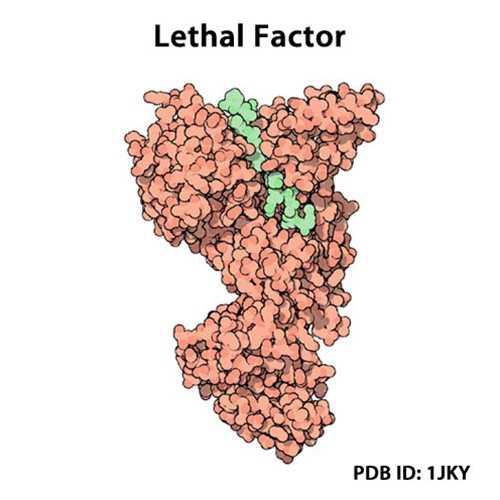LF E687A (Anthrax Lethal Factor Mutant (LF E687A))
This is an inactive, catalytic site mutation (E687A) of lethal factor (LF). Note that this mutant has the native LF N-terminus, AGG.
Anthrax toxin is a three-protein exotoxin secreted by virulent strains of the bacterium, Bacillus anthracis, the causative agent of anthrax. Anthrax toxin is composed of a cell-binding protein, known as protective antigen (PA), and two enzyme components, called edema factor (EF) and lethal factor (LF). Anthrax is caused by B. anthracis, a spore-forming, Gram positive, rod-shaped bacterium. The lethality of the disease is caused by the bacterium's two principal virulence factors: the polyglutamic acid capsule, which is anti-phagocytic, and the tripartite protein toxin, called anthrax toxin.
From the laboratory of Stephen H. Leppla, PhD, National Institute of Allergy and Infectious Diseases/NIH.
Read about how this product was utilized by Absolute Antibody to validate their, Recombinant Engineered Antibodies Against Anthrax.
This is an inactive, catalytic site mutation (E687A) of lethal factor (LF). Note that this mutant has the native LF N-terminus, AGG.
Anthrax toxin is a three-protein exotoxin secreted by virulent strains of the bacterium, Bacillus anthracis, the causative agent of anthrax. Anthrax toxin is composed of a cell-binding protein, known as protective antigen (PA), and two enzyme components, called edema factor (EF) and lethal factor (LF). Anthrax is caused by B. anthracis, a spore-forming, Gram positive, rod-shaped bacterium. The lethality of the disease is caused by the bacterium's two principal virulence factors: the polyglutamic acid capsule, which is anti-phagocytic, and the tripartite protein toxin, called anthrax toxin.
From the laboratory of Stephen H. Leppla, PhD, National Institute of Allergy and Infectious Diseases/NIH.
Read about how this product was utilized by Absolute Antibody to validate their, Recombinant Engineered Antibodies Against Anthrax.
In order to purchase this product, we require a Letter of Assurance form to be completed. Download form here: ![]() Kerafast Letter of Assurance
Kerafast Letter of Assurance
| Product Type: | Protein |
| Name: | E678A |
| Alternative Name(s): | LF E687A |
| Accession ID: | P15917 |
| Source: | Expressed in avirulent engineered B. anthracisstrain BH450 |
| Format: | Purified protein (liquid) |
| Purity: | Hydroxyapatite Chromatography |
| Buffer: | 10 mM HEPES pH 7.5, 0.50 mM EDTA |
| Concentration: | 3mg/mL |
| Storage: | -80C |
| Shipped: | Dry ice |
- Leppla SH. Production and purification of anthrax toxin. Methods Enzymol. 1988;165:103-16.
- Vitale, G., Pellizzari, R., Recchi, C., Napolitani, G., Mock, M., and Montecucco, C. (1998) Anthrax lethal factor cleaves the N-terminus of MAPKKs and induces tyrosine/threonine phosphorylation of MAPKs in cultured macrophages. Biochem.Biophys.Res.Commun. 248, 706-711
If you publish research with this product, please let us know so we can cite your paper.


